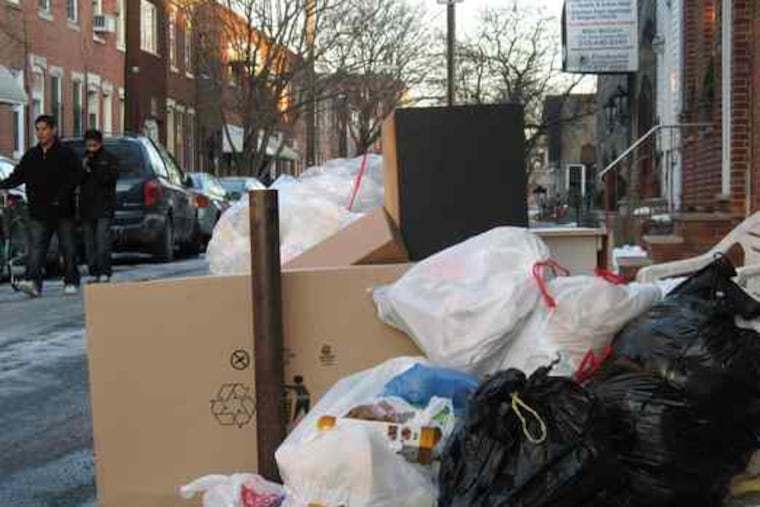O glorious day! Philly is (possibly) getting its streets swept | Mike Newall
I’m dreaming of that wonderful morning when, like old Scrooge in his nightgown and cap, I’ll fling open my shutters to hear an urchin scream "It's STREET SWEEPING DAY!"

It’s a Christmas miracle: Philly is getting a street-sweeping program.
Well, a “possible pilot program.” And one that won’t launch until spring, if it does. And one that we have precious few details about. But in our fair, trash-rich realm, it’s glad tidings for Philadelphians who have been advocating for such a program for years, and for your trusty columnist, who has been advocating for it for a week.
Last week, this column was conjuring ghosts of street sweepers past. Like Frank DiCicco, the city councilman whose legacy is forever chained, Jacob Marley-style, to the time he tried and failed to launch a street-sweeping program in South Philadelphia. Tragically, he won only 60 percent of the vote in his next election.
This week, though, I’m dreaming of that wonderful morning when, like old Scrooge in his nightgown and cap on Christmas, I’ll fling open my shutters and scream to urchins in the street. “What’s to-day, my fine fellow?” I’ll howl at a passing scamp.
“To-day!” the little wretch will reply. “Why, STREET-SWEEPING DAY.”
O joy! O glorious! Heavenly sidewalks. Sweet, clean streets. Merry trash receptacles.
I may be guilty of slight exaggeration. Still, in our filthy city, the only major city in the country without a street-sweeping program, this is encouraging news.
Nic Esposito, the city’s litter czar, announced the program during a conversation Wednesday morning with me, WHYY journalist Ryan Briggs, and host Marty Moss-Coane on WHYY’s Radio Times.
There’s a lot we don’t know about the program, such as what neighborhoods it would target, when exactly it would launch, how often the streets would be cleaned, and — perhaps most important for DiCicco’s rattling ghost — what it would mean for parking. Will people have to move their cars? We don’t know yet.
(There is technology these days, Esposito said, that can clean the streets with fewer parking disruptions. So, breathe easier, South Philly.)
Esposito was quick to point out that street sweeping isn’t a silver bullet, and he noted the city’s success in the last 16 months at identifying the city’s worst trash hot spots, curbing short dumping and illegal tire disposal, and supporting community efforts to clean the streets.
He says this has all laid the groundwork for the street-sweeping pilot. “We would have failed miserably,” he said, if the city simply launched a street-sweeping program out of the gate. It wants the program to be sustainable.
I applaud the city for everything it’s doing, and I know that, like everything in Philadelphia, there’s no easy solution to our trash problem. But I think that all of the city’s data-driven trash initiatives would be much more effective if they were coupled with this basic service that every other major city in the country has provided for decades.
Moss-Coane started Wednesday’s show with a reference to the 1940s, when Philadelphia was known as the cleanest city in the country and was even lauded by the National Clean-Up Paint-Up Fix-Up Bureau. If the old boys from the bureau could see us these past few years, they’d be rolling in their graves.
Even as we move forward, Philadelphia is at the top of so many ignominious lists. We’re the poorest big city, the hungriest. Our opioid crisis outpaces that of every other major city. And for now, we’re still the dirtiest. We have big problems here — and, in some cases, big, ambitious solutions. But when it came to trash, for so long, we let a simple solution languish in a municipal garage.
As I told Esposito on the air, I’d happily drive of those glorious trash Zambonis when they finally make it to the streets, and I mean it. Let’s start the engines.